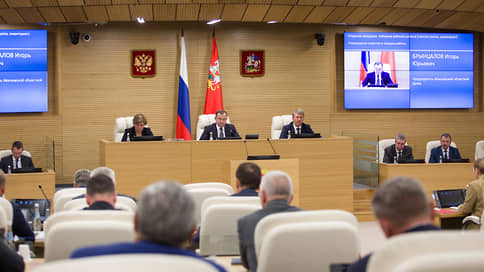The Moscow region is brought into line – Newspaper Kommersant No. 166 (7367) of 09/09/2022
[ad_1]

The Moscow Regional Duma opened the autumn session on Thursday by adopting in the first reading the updated charter of the region, which removes the limit on the number of gubernatorial terms. The new federal law on public authority left this issue to the discretion of the constituent entities of the Russian Federation, and of those regions where local laws have already been brought into line with the federal one, only the Leningrad Region has retained the limit for two gubernatorial terms. The governor of the Moscow Region, Andrei Vorobyov, has not yet announced his desire to be re-elected in 2023.
At the first meeting of the autumn session on September 8, the Moscow Regional Duma, without question, adopted in the first reading a new version of the region’s charter, which is brought into line with the Constitution updated in the summer of 2020 and the law on public authority adopted in its development. Among other things, the draft charter abolishes the rule that one person cannot hold the governor’s office for more than two terms. “I emphasize that this does not in any way limit the voting rights of our citizens: which candidate will take the post of head of the region will be decided in the elections in an open and competitive struggle,” regional Duma speaker Igor Bryntsalov explained to Kommersant.
There are also a number of other innovations in the project. Thus, the government of the Moscow Region, along with the governor, will have the right to initiate legislation. The Moscow Regional Duma will no longer establish the procedure for recalling the governor – this item is also being brought into line with the federal law on public authority. “The new edition adds public control to the list of legal institutions of democracy, in addition to referendums, elections, civil initiatives, popular discussion,” Mr. Bryntsalov said. Also, according to him, the Moscow Regional Duma received the right to express no confidence in the officials of the government of the region, in the appointment of which she took part, which would entail their immediate dismissal. According to regional laws, the Moscow Regional Duma coordinates the appointment of vice-governors and deputy prime ministers. It should be noted that, according to the current charter, the regional duma has the right to express no confidence in the head of the executive body of state power, but the governor must decide his fate within a month. Parliament can also express no confidence in a member of the government or apply to the head of the region with a proposal to consider the issue of his suitability for the position he is filling.
Recall that the law “On the General Principles of Organization of Public Power in the Subjects of the Russian Federation” came into force on December 21, 2021. It replaced the framework law on regional authorities and was supplemented with a number of innovations: in addition to abolishing the limitation on the number of gubernatorial terms, the document, in particular, simplified the procedure for dismissing the heads of constituent entities due to the loss of the president’s confidence and gave the federal ministries the right to coordinate the candidacies of the heads of a number of regional bodies. All constituent entities of the Russian Federation must bring their laws into line with federal laws by January 1, 2023.
When the draft law on public authority was being discussed in the State Duma, its co-author, head of the State Construction Committee Pavel Krasheninnikov, explained that the exclusion from the document of the norm on the limit of gubernatorial terms does not mean its automatic abolition, and the constituent entities of the Russian Federation should decide for themselves whether to maintain this restriction. However, practice has shown that locally the new law is interpreted quite unambiguously – as the lifting of the ban for the third and subsequent terms. As a result, of those regions where they have already brought their laws into line with the federal one, the decision not to lift the restriction on the length of time in office of governor was taken only by the Leningrad Region.
We also note that, commenting on the “zeroing” of gubernatorial terms resulting from the new law, many experts noted that this innovation will primarily affect the head of the Moscow region Andrei Vorobyov and the mayor of Moscow Sergei Sobyanin, whose second term expires in 2023. At the same time, the current charter of Moscow does not contain any restrictions on the terms of the mayor. Mr. Vorobyov has not yet announced his intention to run for a third term, and his press service did not promptly respond to the corresponding question from Kommersant.
Political scientist Rostislav Turovsky is sure that Andrei Vorobyov is counting on re-election. “He is among those governors who were initially the beneficiary of the new federal legislation. And now the time has come to remove the restriction at the level of the region itself,” the expert notes.
[ad_2]
Source link








